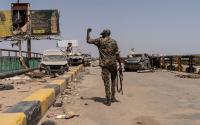By Jonathan Brown, Amol Rajan and Ben RussellFriday, 15 February 2008
An international coalition of human rights activists has urged corporate sponsors of the Beijing Olympics to call the Chinese government to account over its support for Sudan or face a series of protests and consumer boycotts in the approach to this summer's Games.
As international condemnation mounted over China's reluctance to censure Khartoum for its conduct in Darfur, campaigners pressured multinational companies including Coca-Cola, McDonald's and Adidas, to end their "silent complicity" with the regime.
The new focus came after a letter that demanded China to use its extensive links with oil-exporting Sudan to press for peace in Darfur was sent to President Hu Jintao by a coalition of Nobel laureates, athletes, celebrities and politicians. The trenchant text, printed on the front page of The Independent, yesterday made further headlines around the world but received a cold welcome among those leaders best positioned to act on its message.
President Bush distanced himself from the letter, as well as the decision of the film director Steven Spielberg to stand down in his role as the Games' artistic director. Mr Bush said he regarded the Olympics as a "sporting event".
China broke its silence over the issue, saying it regretted the Hollywood star's resignation.
The country's state-owned media accused Western countries of exploitation, insisting the Chinese public were "disgusted" and "baffled" by attempts to influence policy ahead of the Olympics. A Foreign Ministry spokesman, Liu Jianchao, said the country would not be deterred in its mission to make the Games a success.
Sudan also leapt to the defence of its key trading partner and political ally. Ali al-Sadig, a Foreign Ministry spokesman, praised Beijing's role in the peacekeeping operation and claimed Spielberg's decision had been based on "wrong information".
But despite the apparent indifference to the Nobel laureates' letter in Beijing, Washington and Khartoum, the signs are that, between now and August, when the Games commence, the pressure on China and those companies and individuals associated with the Olympics will not let up.
The New York-based Olympic Dream For Darfur (ODFD), backed by the actress Mia Farrow, has launched a campaign to target sponsor companies hoping to use this summer's global sporting jamboree to promote themselves to China's booming domestic market.
ODFD's director, Jill Savitt, said it was focusing on 19 Western-owned firms from among the 64 corporate backers who have signed deals as Olympic partners, sponsors or suppliers.
The pressure group has drawn up a report card looking at efforts each company has made to raise concerns over China's Africa policy. It asked them to use their influence with the International Olympic Committee and the 2008 host nation to bring peace on the ground to Darfur.
Among the actions it recommended were co-signing a letter to President Hu warning that the crisis could tarnish the Olympic ideal as well as making a direct appeal for Beijing to intervene to stop the killing. None did so.
Only two – General Electric and McDonald's – were prepared to contact the Olympic movement about the issue, though others – Adidas, Coca-Cola and Johnson & Johnson - earned credit for either giving aid to Darfur or taking other "responsible" steps.
"We are not asking them to make a crazy gesture or boycott the Games, we are simply asking them to speak up," Ms Savitt said. "Each of these companies is very afraid of China of incurring its wrath or that of its 1.3 billion consumers so we thought we would try to get them to act in concert. As a world community, we said one of the reasons that China got the Games was to open up to the outside world, so for that reason why won't these companies, especially those based in countries that respect human rights do anything?"
The Independent contacted 18 of the corporate sponsors with British links yesterday. The overwhelming majority failed to return the calls or declined to comment while six issued statements defending their support for the Beijing Olympics. None indicated a willingnessto voice concerns directly to the Chinese government.
Coca-Cola said it preferred to give aid directly to the troubled region saying it felt it was not its role to "give governments suggestions about the foreign policy their country should follow".
The computer firm Lenovo expressed "great empathy for the people of Darfur" but declined to comment on the political situation. Adidas, the Sportswear manufacturer, and McDonald's both said the conflict could only be solved at a government level, while Panasonic insisted its support for the Olympic ideal was "independent of local contingencies".
A statement by Johnson & Johnson said: "Johnson & Johnson is dedicated to improving the health and well-being of people around the world. We do that best by developing products that help people live healthier lives."
In Britain, Tessa Jowell, the Olympics minister, said it was "reasonable" to use the publicity generated by the Games to push for Beijing to cut ties with the Sudanese regime. She praised the "eloquent" plea for action by the eight Nobel laureates but rejected calls for a boycott.
Darfur: the facts
* The conflict has affected more than three million people in Darfur and eastern Chad (US govt, EU, UN)
* 2.2 million people are displaced within Darfur (UN Office for the Coordination of Humanitarian Affairs)
* 15,000 people die each month (Coalition for International Justice)
* 400,000 have fled to refugee camps in neighbouring Chad (United Nations High Commissioner for Refugees)
* More than 20 per cent of children under five are suffering from severe malnutrition and many are dying each day (UN World Food Programme)
* Crude oil exports from Sudan to China more than doubled last year to top 200,000 barrels a day, with data showing that China now takes 40 per cent of the country's total output
* Only 50 per cent of people in need are receiving food assistance (UN World Food Programme)
* Critics accuse China of abetting mass killing in Darfur by using its power as a permanent member of the UN Security Council to stall or dilute bids to deal with the conflict. They also continue military relations with the Sudanese government
What the sponsors said...
Coca-Cola: "Not our role to give suggestions"
Lenovo: "Not Lenovo's place to comment on politics"
Adidas: "Governments have responsibility"
McDonalds: "United Nations should drive solution"
Panasonic: "Support for the Olympics is independent of local contingencies"
BHP Billiton: Failed to respond
Staples: Failed to respond
Snickers: Failed to respond
PricewaterhouseCoopers: "No comment"
Volkswagen: "I'll get German office to call you"
Visa: Failed to respond
Microsoft: Failed to respond
Samsung: Failed to respond
Eastman Kodak: Failed to respond
General Electric: Failed to respond
Omega/Swatch: Failed to respond
Manulife: Failed to respond






